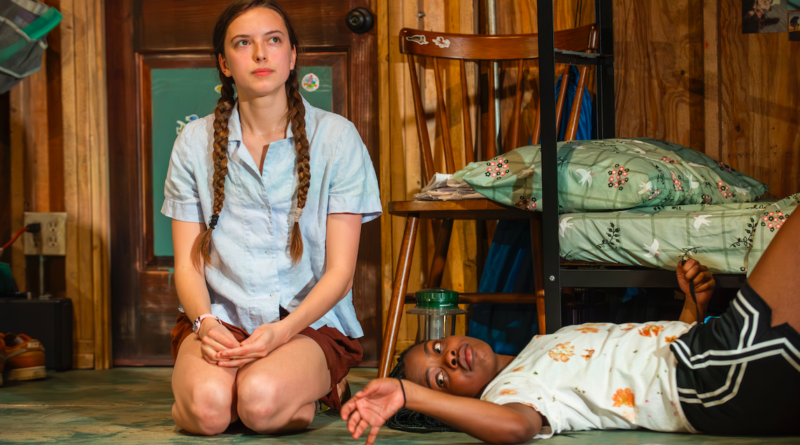REVIEW: ‘Grief Camp’ follows teenagers overcoming obstacles, on their own terms
Photo: From left, Grace Brennan and Lark White star in Grief Camp at the Atlantic Theater Company. Photo courtesy of Ahron R. Foster / Provided by BBB with permission.
NEW YORK — Atlantic Theater Company’s new play, Grief Camp, written by Eliya Smith, is like nothing that has ever appeared on stage before. This unconventional show, directed by Les Waters, follows a group of teenagers who are participating in a summertime “grief camp” that gives them time away from loved ones and a season of warm weather to just be themselves. There is no traditional plot, no typical narrative arc. Instead, Smith has the action bubble up organically, with the characters on stage opening up to their peers, but also staying quiet and choosing not to divulge certain facts. The power of the dialogue and the exquisite cast who bring these words to life are something to behold, almost as if Grief Camp was documentary theater, with the audience taking the place of a camera that hits record.
Jack DiFalco plays Cade, who is slightly different than his fellow campers. He’s actually more of a counselor, an alum of the grief camp himself. He bunks in the same room, but also keeps everyone on schedule and participates in structured talks with the teenagers in his care. Renée-Nicole Powell plays Olivia, who takes a liking to Cade and offers uncomfortable monologues in his presence to cause a stir. He’s older than her and in a role of authority, so he doesn’t flirt back. But their relationship is one of the most unique, unsettling and real exchanges in the play.
Lark White plays Ester, who talks often about beauty, and her best friend is Luna, played by Grace Brenann. They both prove inseparable, and as their relationship continues, they begin to share details about the reason for their attendance at camp. Maaike Laanstra-Corn’s Blue character may be the most engaging of them all. She’s a bit of a loner, but she’s also relying on the help of her fellow campers to develop a new play she’s written, a surreal drama that confounds more than comforts.
At first, this reviewer took a while to figure out the lay of the land. The play begins quietly, with the campers sleeping and the lights at the Atlantic Theater Company’s Linda Gross Theater slowly illuminating, almost as if the moon is growing ever higher in the sky. Eventually the campers, at least the ones who are still awake, start to talk to one another. They don’t offer showy introductions of who their character is or what makes them tick; they don’t allow exact details of what personal loss they have faced to land a spot at “grief camp.” Instead, Smith keeps the dialogue realistic, with little micro-bursts of drama and comedy, like the need to share a common bathroom, the funny recitations that are shouted into a box fan to create the Darth Vader voice, the campers’ evident need to be heard and understood, to be together yet sometimes alone.
Once the characters are established, with some obvious pairings of friends and budding romances, the story is a little bit easier to follow, but still Smith holds on to the unconventionality of the proceedings. For 90 minutes, she never goes for easy laughs or wrapped-up dramatic flourishes, never ties everything together with a neat bow. These characters are hurting, and some of them are despondent, depressed and uncertain. Their dialogue and observances of life never stray from believability. Smith is genuine in her attempt to comprehend and give space to these individuals. In turn, her creations are offered the chance to be themselves, which is likely quite different than their everyday lives back home.
The stage is a mess of unmade beds, with a central door that leads to an off-stage bathroom. Stage-right also features a porch, where Alden Harris-McCoy’s guitarist sits and strums some chords. The play never leaves this cabin and its immediate surroundings, which seems fitting. These four walls, after all, can be both a comfort zone and a means of suffocation, a place of refuge and a prison cell.
Grief Camp, more than most plays running nowadays, takes some creative risks in its storytelling and character development, and those risks pay off. Smith, making her off-Broadway debut, is a welcome presence on the New York theatrical scene, someone who has an uncanny ability to document the human experience and how conversations evolve and devolve based on what’s said and what’s left unsaid. This is one of the strongest shows of the off-Broadway season.
By John Soltes / Publisher / John@HollywoodSoapbox.com
Grief Camp, written by Eliya Smith and directed by Les Waters, continues through May 11 at the Atlantic Theater Company’s Linda Gross Theater. Running time: 90 minutes with no intermission. Click here for more information and tickets.

